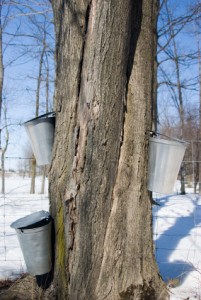Maple sugaring season is finally underway here, with smoke and steam from boiled sap comingling above thousands of New England sugarhouses.
 What most people don’t realize is that those sugarhouses are emitting a lot less steam and smoke these days. But not due to a decline in production…maple syrup yields were some of best on record last year, up 30% nationwide.
What most people don’t realize is that those sugarhouses are emitting a lot less steam and smoke these days. But not due to a decline in production…maple syrup yields were some of best on record last year, up 30% nationwide.
Instead, a clever-and-perhaps-lazy sugarbush farmer had an epiphany back in the ‘70s to experiment with a reverse osmosis machine in an attempt to cut down on the time, fuel and sweat he put into boiling his sap down to syrup.
Reverse osmosis is a technology originally invented to purify water, such as for desalinating sea water to get fresh water. By applying the same technology to maple syrup production, producers discovered they can remove 75-80% of the water from the sugary sap, dramatically reducing the boiling effort.
The lesson to cleantech companies is that innovation doesn’t always have to be invented from scratch; sometimes you can achieve breakthroughs by repurposing existing innovations from other industries.
That’s not to suggest that solar, biofuel or wind energy companies should detour from their current R&D quests for the most energy efficient materials, enzymes or geometries.
And to keep things in perspective, the environmental gains of using reverse osmosis in maple syrup production is scant at best, since the sugaring operations are small scale and the season lasts just a couple months.
Yet consider this: my maple syrup-producing neighbor in Vermont used to burn through 40 cords dirty slag wood each year. He now burns just 6 cords since he started using reverse osmosis – which translates into a staggering 85% reduction in energy consumption.
What if some undiscovered, unintentional use of an existing technology could achieve comparable levels of performance in, say, the processing of biofuel feedstocks or the combustionable efficiency of other fuels? I’m just saying that if some farmer can revolutionize an industry by asking “what if I was to hook up that contraption to my syrup tank…?” why shouldn’t cleantech companies ask the same kind of questions of not-so-obvious existing technologies?